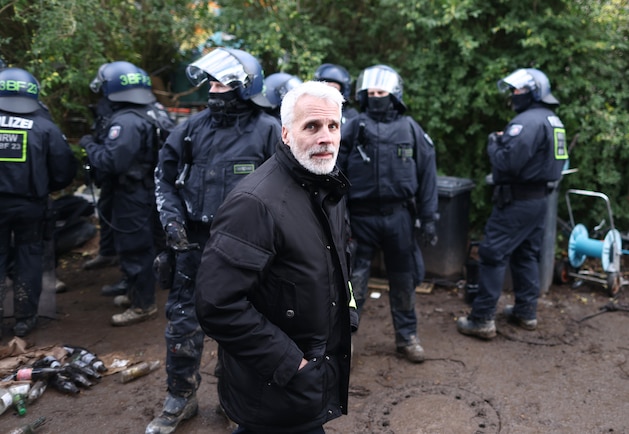The operation in Lützerath is led by Dirk Weinspach, chief of police in Aachen – and member of the Greens. The 63-year-old says that in the lignite village, people are paying for the failures of the past. But his understanding of the activists has limits.
“Scary” is what Dirk Weinspach calls a group of climate activists in Lützerath. This has entrenched itself in a self-dug tunnel that is supposed to stop the heavy clearing vehicles on their way to Lützerath. The tunnel could collapse if emergency services unwittingly drive over it, burying activists alive.
Weinspach, chief of police in Aachen and head of the clearance operations in Lützerath, has no understanding of this. “I don’t understand how you can put yourself in danger like that, that doesn’t serve the purpose,” he says to “Spiegel”. The 63-year-old can understand the concerns of the activists – he is a member of the Greens himself.
Instead of being based in Aachen, Weinspach is on site in Lützerath. In the lignite village, the man with the white beard has become the face of the evacuation. He speaks to many people, activists, observers, paramedics or representatives of environmental organizations. “The word is our first resource,” says the police chief.
Weinspach also exemplifies this in an open letter that he published a few days ago. “I wish the evacuation of Lützerath could have been avoided. But sadly, for all I know, it’s inevitable,” he wrote. It was a “legal order” for the police, he later said. The police are neither competent nor responsible to check Lützerath’s political decision.
Doubts can be read from these words. Nevertheless, Weinspach immediately agreed to being accompanied by reporters from “Spiegel” on a full day of operations. “We’re doing something that’s politically controversial,” says the police chief, “but it’s important to me that we do it professionally, in accordance with the rule of law and in accordance with our legal mandate.”
In the early morning of Thursday, January 12, a spokesman reported that Luisa Neubauer was criticizing on Twitter that the police were also clearing Lützerath at night. Weinspach recently wrote to the activist personally to meet and talk about everything. So far it hasn’t happened.
Then the 63-year-old received a curious request. The German Architecture Museum has come forward with a request not to destroy one of the wooden houses that the activists in Lützerath built themselves. The hut has historical value and should be transferred to the museum. “Are they kidding me?” Weinspach asks. His colleague says no and shows him the printed mail from the museum. After a quick look, the chief of police reacts. “Let others take care of it.”
At 11 a.m. there is a situation briefing with police officers, fire brigade and forces from the public order office. Live images from Lützerath, supplied by helicopters and drones, can be seen on a flat screen. Next to it is a map of the location with each building and tree house marked. Red pin means activists, yellow ongoing operation and green cleared. On Thursday morning the map is almost completely red – in the evening most of the needles are green.
While walking through the muddy town of Lützerath, the chief of police meets a group of activists who have started a sit-in on a country lane. Police officers have surrounded the group, which also includes Luisa Neubauer. But Weinspach does not want to speak to her in this situation. “Wrong moment,” he tells the “Spiegel” reporters.
Another activist asks why the police use pain holds. According to Weinspach, they are allowed to break resistance, which is sometimes the last resort. “But for some, there is a second cry even before the first grip.”
“We always left corridors for the people in Lützerath,” emphasizes the police chief, “we gave them the opportunity to leave voluntarily. Anyone who wanted to be taken out, we took them out, and in most cases we didn’t even take their personal details or fingerprints.” Then he restricts it. “But de-escalation does not mean that there is no evacuation.”
However, allegations of violence made during the eviction will all be investigated. “If criminally relevant facts are in question, the investigations are handed over to another police authority for reasons of neutrality,” explains Weinspach. A little later he watches as police officers in black uniforms break into the Paulahof, a well-known building in Lützerath in which numerous activists were holed up.
Weinspach is asked what he says about the various reports that either support the approach in Lützerath or call it unnecessary. “I am amazed at people who say: only this or that report is correct. I’m more careful,” he says. The only thing that is certain is that all calculations are based on figures that are “partially speculative”. It is clear, however, that “we are paying for the omissions and misjudgements of the past, the climate change is coming much too late”.















